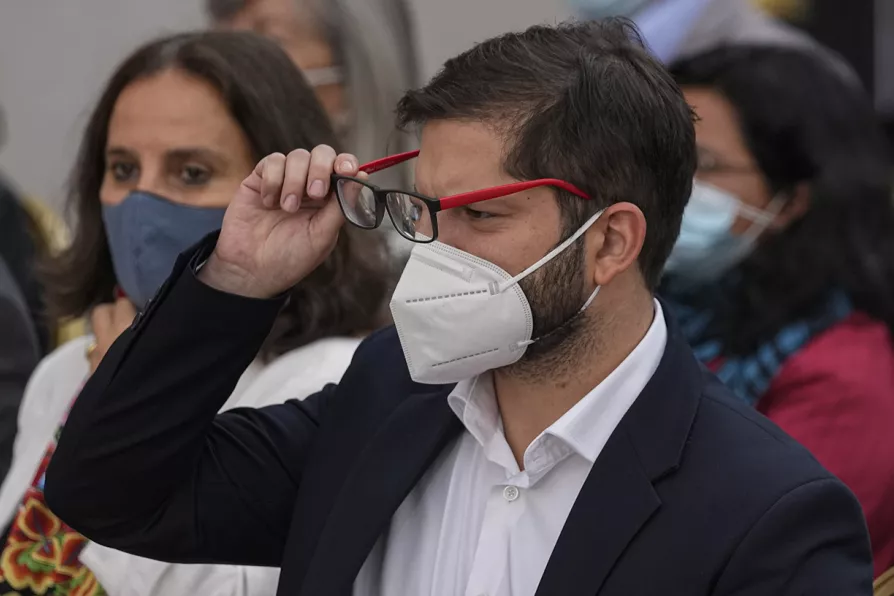SOLOMON HUGHES reveals how six MPs enjoyed £400-£600 hospitality at Ditchley Park for Google’s ‘AI parliamentary scheme’ — supposedly to develop ‘effective scrutiny’ of artificial intelligence, but actually funded by the increasingly unsavoury tech giant itself

 Chile’s new president Gabriel Boric
Chile’s new president Gabriel Boric
“I BELIEVE that this is a government mainly of the centre-left,” said Camila Vallejo, a member of the Communist Party of Chile (CPC) and spokesperson for Gabriel Boric’s office.
Speaking to El Mercurio newspaper, which was subsidised by the CIA in the 1970 and it had its building in Valparaiso set on fire by protesters in October 2019, Vallejo emphasised that the government “has a programme that includes aspects of European social democracy.”
The new minister for the economy, Nicolas Grau, said in an interview with the newspaper Pulso that “our programme could be described mainly as social democratic.”
In one of the presidential debates before the elections, Boric himself, answering a journalist, asserted that he was not bothered by the definition of his programmatic proposals as social democratic.
The economist and former finance minister in the centrist government of Patricio Aylwin, Carlos Ominami, argued in a column in the newspaper La Tercera that “Chile is seeking to deepen democracy and overcome neoliberalism through institutional channels.
“In short, a sort of new ‘Chilean way’ towards something that needs a precise definition, but which necessarily combines elements of social democracy, ecology and feminism.”
Boric himself said some time ago that “if Chile was the cradle of neoliberalism, it will also be its tomb” — a position held by the left wing rather than the social democrats.
In his programme Boric envisages dismantling the private pension system, strengthening sovereignty over natural resources (lithium and copper), creating a universal health service separate from the current privatised system, advancing labour equality with more and better rights for workers, carrying out in-depth tax reform, reinforcing a feminist perspective of society and generating profound changes in the development model, leaving behind the present extractivist pattern for a sustainable one.
The implementation of this programme, given the current correlation of forces in the Chilean parliament where seats in the Senate are tied (25-25) and the ruling coalition lacks of the necessary majority to pass laws in the lower house — meant that ministers had to be incorporated from the Socialist and Por la Democracia parties as well as a few independents.
Lautaro Carmona, the secretary general of the CPC, told El Siglo: “I understand that a broader cabinet does not mean moderation of the programme, but rather creates better conditions for implementing it.”
Carmona insists this will be a government “of structural transformations, guaranteeing more social rights, improving the quality of democracy, safeguarding human rights and making progress in dismantling the current hegemonic model.”
There is, however, a fundamental factor that could have an impact on Boric’s administration — the approval of the new constitution in a poll to be held in the last quarter of this year, the text of which is currently being worked on in the Constitutional Convention.
In an interview with the Uruguayan newspaper La Diaria, the secretary seneral of the presidency, Giorgio Jackson, acknowledged that “it is true that it will be difficult to implement aspects of our government programme without a constitutional change.
“Without constitutional change, the health reform and the reform of sexual and reproductive rights run the risk of being considered unconstitutional under the current Magna Carta. The same goes for some labour standards.”
The other element is that it is hoped for by leftwingers within the new administration is that the social movement and civil society organisations will accompany the transformations as a “street parliament” and provide the government with a base of support that puts pressure on the conservative forces and opposition in general.
“One cannot limit a transformative project only to participation in the cabinet or institutional spaces such as municipalities, regional councils or parliament,” CPC senator Daniel Nunez warned.
“What we have to understand here is that we must generate a citizen and social force that defends the government and supports the transformations.”
In any case, there is agreement in Chile that what is at stake is a dispute over the future of Chile — ultimately, a confrontation between the forces of transformation and the conservative ones favouring the neoliberal status quo.
Certainly, the business associations, financial groups, the mass media, the right and the so-called “military family” will have a lot to say in all of this.
So far there has been no sign, let alone a declaration, that Boric’s administration considers itself part of the “left-wing and progressive bloc” in Latin America, alongside governments of countries such as Cuba, Venezuela, Bolivia, Nicaragua, Mexico and Argentina.
The President of Cuba, Miguel Diaz-Canel was invited to Boric inauguration ceremony, but Venezuela and Nicaragua had only their ambassadors accredited in Santiago invited.
There is also uncertainty about foreign policy — Foreign Minister Antonia Urrejola is hostile to Cuba, Venezuela and Nicaragua and was a conservative president of the Inter-American Commission on Human Rights of the Organisation of American States.
In the end, only the work carried out over the next four years will be the true yardstick for the political and ideological definition of this government, but regardless of labels the most important thing will be whether it succeeds in enshrining the transformations both in law and the hearts and minds of the majority of Chileans.
Hugo Guzman is director of El Siglo newspaper.

















